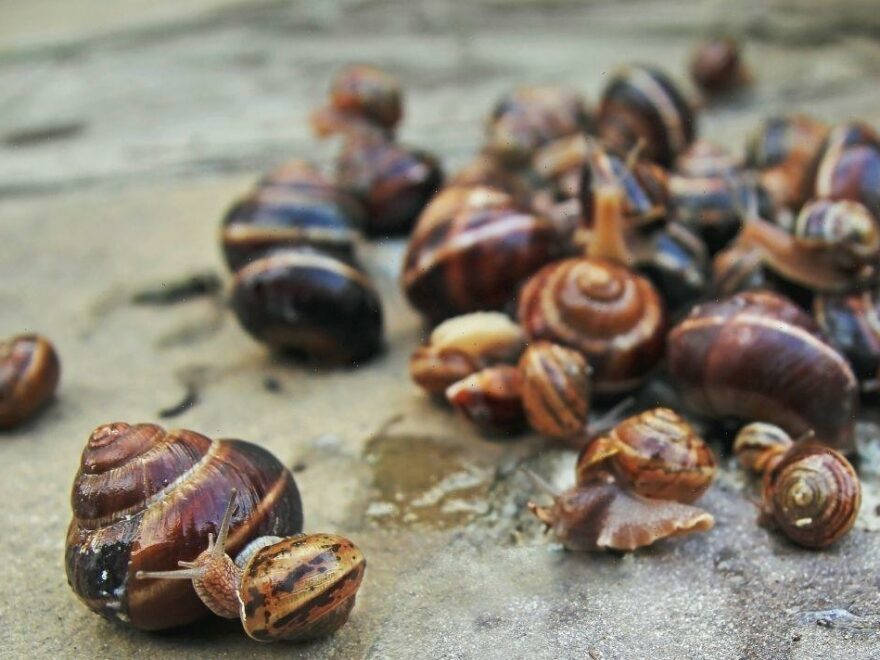Gardening: How to create a watering tool for your plants
We use your sign-up to provide content in ways you’ve consented to and to improve our understanding of you. This may include adverts from us and 3rd parties based on our understanding. You can unsubscribe at any time. More info
If you have snails in your garden, they’re most likely to be common garden snails, also known as brown garden snails. And although these tend to be completely harmless to humans, they can, inadvertently terrorise an entire garden with their eating habits. There is no complete cure for an infestation, however, there are effective methods to prevent and deter snails from your plants.
If you come across silvery trails on plants and paths in the garden, it’s more than likely to have been caused by a snail – or its nefarious counterpart, a slug.
Another common sign of slugs is tampered edges or holes in plant leaves – especially higher up, as snails are known for their spectacular climbing skills.
They tend to emerge during the darker hours, especially after rain and congregate in the more shady areas beneath leaves, planters and rims of containers.
Nearly all plants are at stake when it comes to snails; they love all and anything leafy and green, ripening fruits – and even rotting compost.
Spring through to Autumn are the seasons you’re more likely to see these critters, as they thrive in warm, damp conditions, making now the perfect time to launch a snail prevention operation.

Dealing with snails can feel like a continuous battle but fortunately, there are some effective methods you can carry out to stop these pests from ruining your garden.
Express.co.uk has compiled six ways to help get rid of snails naturally.
Build a scratchy fort
Snails find it difficult to cross prickly borders, making this a perfect solution to help protect plants.
Placing sharp gravel, grit, nutshells, eggshells and prickly cuttings around vulnerable plants could help deter them from approaching.
Homes and Gardens also recommend wool pellets and abrasive, dried, granulated seaweed.

Put up a metal barrier
Barriers are particularly effective snail repellents and a good one to use is a metal snail collar.
These sink into the ground around plants and stop the snails in their tracks.
You can also use materials such as copper wire and even just mesh curved outwards as a means to repel them.
Sow a tasty, snail-friendly crop
If building barriers isn’t for you, you might want to distract them with bait.
Snails love lettuce, so by planting a sacrificial row of them somewhere in your garden, it can attract the snails to congregate over there instead of on and around your favourite plants.
DON’T MISS:
What do plants need to grow – five essential elements [EXPLAINED]
Household items you can use to kill your weeds within days [INSIGHT]
Are garden gnomes bad luck in your home? Where to place [ANALYSIS]

Keep plant pots secure with sticky substances
Another easy and effective method to protect your plants from snails is through the use of sticky substances like Vaseline.
Try smearing Vaseline on rims and bases of plant pots. The slipper texture will make it hard for snails to grip, which will put them off their attempts.
Use emptied grapefruit halves
Slice a grapefruit in half and scoop out the innards. Place the emptied grapefruit halves near the targeted plants and leave them overnight.
You should find plenty of slugs in the morning, which you can then set then discard of them in nearby fields, woodland, or parks.
Attract natural predators
You can also give the wildlife food chain a boost by doing more to attract birds to your garden.
Birds love snails, so by setting up birdbaths or birdfeeders around your garden, you’ll attract these natural predators to help control any snail infestations you might have.
Birds can also help out with ants, so if you have a problem with these too, attracting the birds will be beneficial all around.
Source: Read Full Article
